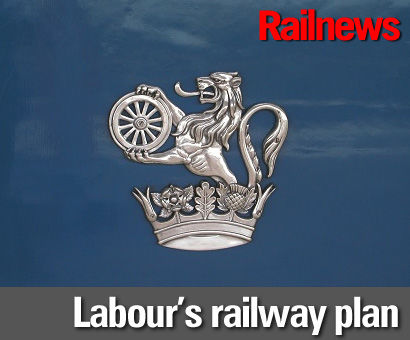LABOUR Party leader Jeremy Corbyn has confirmed his plans to renationalise the railways.
He made the pledge at the annual conference of the RMT.
The railways are only partly privately run at the moment, because Network Rail has been a government body in the public sector since September 2014. Even so, writing in the July edition of Railnews, Network Rail chief executive Mark Carne says: “We are on the move and changing from what some people described as ‘a state-regulated monopoly’ into one that’s decentralised, devolved, innovative and customer focused – an organisation that thinks and operates just like any savvy, enterprising, private sector business.”
Labour’s target appears to be the franchised passenger operators, and it has been speculated that there are two ways of ending their participation, One is to allow the existing franchises to terminate naturally, and the second is to take advantage of ‘break points’ which exist in some contracts.
Forcible confiscation of current franchises is unlikely because franchise-holders could challenge this in court, and claim substantial damages for breach of contract and loss of profits.
Labour has not mentioned other private sector elements within the railway industry, such as the rolling stock leasing companies or freight operators. Again, any forced renationalisation of the kind authorised by the now-repealed 1947 Transport Act would probably be very expensive.
Mr Corbyn said: “The next Labour government will introduce a Public Ownership of the Railways Bill to repeal the Tories’ 1993 Railways Act that privatised our railways. We want our railways run in the public interest with fare rises capped, service levels improved and stations and trains safely staffed.”
His pledge was welcomed by the audience at the RMT annual conference on 25 June. The union’s general secretary Mick Cash responded: “RMT is delighted that, Jeremy Corbyn, our long-term friend and comrade, has set out a vision for the transport industry in Britain that frees us from the profiteering and fragmentation of privatisation and which would allow the public to own and control the services that they rely on. That is a clean break from more than two decades of the privatised rip-off that has consigned Britain to the transport slow lane.
“The mood in the country has very clearly changed since the Tories called the General Election. Cuts, austerity and privatised greed are on the way out and a Labour government with a programme dedicated to the many and not the few is waiting in the wings. RMT will do everything we can to make sure that that Government, committed to public ownership and workers' rights, arrives sooner rather than later.”
If franchises are allowed to fade away, the process seems likely to be prolonged and would continue through several Parliaments. Unless break points are available, the longest English franchise, c2c, is not set to end until November 2029, while the forthcoming West Coast Partnership, which is to start in April 2019, is planned to run for at least ten years and possibly until 2031.
It is also not clear what would happen to franchises awarded by devolved authorities. Apart from Transport for London contracts, there is one in England – Merseyrail – one in Wales and two in Scotland. Several light rail systems are also run under concession arrangements, although two of these, Tyne & Wear Metro and Midland Metro trams, have lost or will soon lose their private sector operators. Tyne & Wear Metro may be relet in a couple of years from now, but on Midland Metro the transfer to local authority operation is intended to be permanent.
Note: the July edition of Railnews will be published on 5 July.


